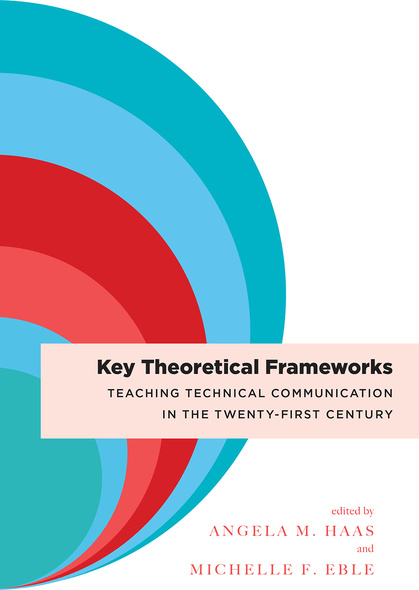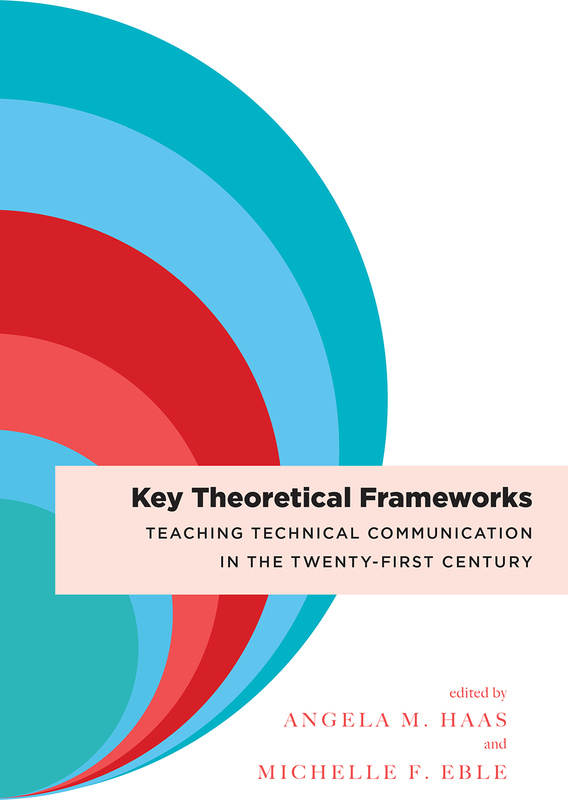Key Theoretical Frameworks
Teaching Technical Communication in the Twenty-First Century
Edited by Angela M. Haas and Michelle F. Eble
Utah State University Press
Drawing on social justice methodologies and cultural studies scholarship, Key Theoretical Frameworks offers new curricular and pedagogical approaches to teaching technical communication. Including original essays by emerging and established scholars, the volume educates students, teachers, and practitioners on identifying and assessing issues of social justice and globalization.
The collection provides a valuable resource for teachers new to translating social justice theories to the classroom by presenting concrete examples related to technical communication. Each contribution adopts a particular theoretical approach, explains the theory, situates it within disciplinary scholarship, contextualizes the approach from the author’s experience, and offers additional teaching applications.
The first volume of its kind, Key Theoretical Frameworks links the theoretical with the pedagogical in order to articulate, use, and assess social justice frameworks for designing and teaching courses in technical communication.
Contributors: Godwin Y. Agboka, Matthew Cox, Marcos Del Hierro, Jessica Edwards, Erin A. Frost, Elise Verzosa Hurley, Natasha N. Jones, Cruz Medina, Marie E. Moeller, Kristen R. Moore, Donnie Johnson Sackey, Gerald Savage, J. Blake Scott, Barbi Smyser-Fauble, Kenneth Walker, Rebecca Walton
The collection provides a valuable resource for teachers new to translating social justice theories to the classroom by presenting concrete examples related to technical communication. Each contribution adopts a particular theoretical approach, explains the theory, situates it within disciplinary scholarship, contextualizes the approach from the author’s experience, and offers additional teaching applications.
The first volume of its kind, Key Theoretical Frameworks links the theoretical with the pedagogical in order to articulate, use, and assess social justice frameworks for designing and teaching courses in technical communication.
Contributors: Godwin Y. Agboka, Matthew Cox, Marcos Del Hierro, Jessica Edwards, Erin A. Frost, Elise Verzosa Hurley, Natasha N. Jones, Cruz Medina, Marie E. Moeller, Kristen R. Moore, Donnie Johnson Sackey, Gerald Savage, J. Blake Scott, Barbi Smyser-Fauble, Kenneth Walker, Rebecca Walton
‘[O]ffers important strategies for technical communication instructors, graduate students, and practitioners to incorporate cultural studies scholarship and social justice perspectives into their work. [P]articularly timely since it suggests ways to foster respectful, rigorous, and thoughtful discussions about the intersections of technical communication, diversity, and civic responsibility.’
—Ann Brady, Michigan Technological University
'The cultural dynamics of this century will continue to put pressure on the place, role, and function of technical communication. As our lives are enmeshed with the artificial, the algorithmic, and the global, there is no domain that isn’t a place of engagement. This book embraces the complexity of the present and near future and provides a rich and necessary playbook for design, research, and responsible communication. This book also gives voice to a new generation of scholars whose work is vital.'
—Jeffrey Grabill, Michigan State University
‘By attuning a generation of technical communicators, through the very ways they are taught to do their work, to worldwide social injustice on the part of hegemonic forces, Key Theoretical Frameworks works to readjust the field at large towards a new methodology of practices which understands and utilizes the globalized power of technical communication to make real change.'
—Communication Design Quarterly
Angela M. Haas is associate professor of rhetoric, technical communication, ethnic, and women’s and gender studies and serves as the graduate program director for the Department of English at Illinois State University. Her research has been recognized with the Conference on College Composition and Communication Technology Innovator Award, the Computers & Composition Ellen Nold Best Article Award, and the C&C Hugh Burns Best Dissertation Award. Haas serves as vice president of the Association of Teachers of Technical Writing and as coordinator of the Computers & Writing Graduate Research Network. Her scholarship has been published in Computers & Composition, Computers & Composition Online, Journal of Business and Technical Communication, Pedagogy, Studies in American Indian Literatures—among other places.
Michelle F. Eble is associate professor of rhetoric and technical communication at East Carolina University. She has published in Computers and Composition, Technical Communication, and Technical Communication Quarterly. She is the coauthor of Primary Research and Writing: People, Places, Spaces and coeditor of Stories on Mentoring: Theory and Praxis, Reclaiming Accountability: Using the Work of Re/Accreditation, and Large-Scale Assessment to Improve Writing Instruction and Writing Programs. She serves as chair of East Carolina’s Behavioral and Social Sciences Institutional Review Board and president of the Association of Teachers of Technical Writing.
Michelle F. Eble is associate professor of rhetoric and technical communication at East Carolina University. She has published in Computers and Composition, Technical Communication, and Technical Communication Quarterly. She is the coauthor of Primary Research and Writing: People, Places, Spaces and coeditor of Stories on Mentoring: Theory and Praxis, Reclaiming Accountability: Using the Work of Re/Accreditation, and Large-Scale Assessment to Improve Writing Instruction and Writing Programs. She serves as chair of East Carolina’s Behavioral and Social Sciences Institutional Review Board and president of the Association of Teachers of Technical Writing.





